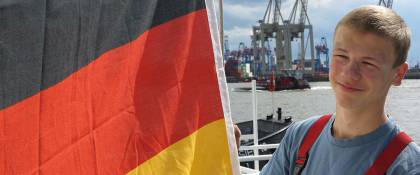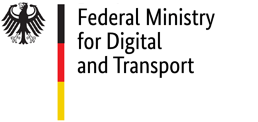Berufsbildungsstelle Seeschifffahrt e.V.
Buschhöhe 8
28357 Bremen
www.machmeer.de
Phone: +49 421 17367-0
Fax: +49 421 17367-15
Mail: info@berufsbildung-see.de
Bundesstelle für Seeunfalluntersuchung (BSU)
Bernhard-Nocht-Straße 78
20359 Hamburg
Phone: +49 40 31 90 - 83 11
24/7-Rufbereitschaft: +49 170 58 65 67 5
Mail: posteingang@bsu-bund.de
Generaldirektion Wasserstraßen und Schifffahrt
Abteilung Schifffahrt
Am Propsthof 51
53121 Bonn
Phone: +49 228 70 90 - 0
Fax: +49 228 70 90 - 90 10
Mail: gdws@wsv.bund.de
Deutscher Wetterdienst (DWD)
Niederlassung Hamburg - Seewetteramt
Bernhard-Nocht-Straße 76
20359 Hamburg
Phone: +49 69 80 62 - 0
Fax: +49 69 80 62 - 61 06
Mail: pmo@dwd.de
Bundesagentur für Arbeit
Zentrale Heuerstelle Hamburg
Nagelsweg 9
20097 Hamburg
Phone: +49 40 24 85-13 13
Fax: +49 4024 85-13 35
Mail: hamburg.heuerstelle@arbeitsagentur.de
Hafenärztliche Dienste
Liste der Hafenärztlichen Dienste in Deutschland:
Kontaktdaten aller deutschen Hafenärztlichen Dienste
Other institutions
- The other institutions of the flag state administration
- Berufsbildungsstelle Seeschifffahrt e.V. (BBS)
- Federal Bureau of Maritime Casualty Investigation (BSU)
- Generaldirektion Wasserstraßen und Schifffahrt (GDWS)
- Deutscher Wetterdienst (DWD)
- Zentrale Heuerstelle Hamburg, ZHH
- Port Health Services
The other institutions of the flag state administration
Aside from the BG Verkehr (Ship Saferty Division), the Federal Maritime and Hydrographic Agency, the Federal Networking Agency and the shipping registers, there are further maritime institutions in Germany that perform tasks of the German Flag State Administration or have particular maritime competences regarding seafarers and shipping companies. Below we introduce some of these institutions to you.
You can find out which authority to contact about the different issues and topics of information under “Experts”.
Berufsbildungsstelle Seeschifffahrt e.V. (Competent body for vocational training for ocean shipping, BBS)
The functions of the Berufsbildungsstelle Seeschifffahrt e.V. are comparable to the functions of the Chambers of Industry and Commerce or the Chambers of Crafts as responsible authority according to the “Berufsbildungsgesetz” (Vocational Training Act). In contrast to the chambers, the BBS is not only responsible for one particular district but takes care of the entire area of the German coast and therefore of the entire federal territory.
The BBS’ functions extend mostly to:
- Advice for educating shipowners, teachers and trainees
- Monitoring vocational education, especially vocational training as a ship’s mechanic
- Conducting the examinations during the training as a ship’s mechanic
- Maintenance of a register of vocational training relationships
- Information on training options in the shipping industry
- Collaboration in the regulation of the vocational training of seafarers
- Approval of ships as training facilities.
The education programmes the BBS supervises are foremost vocational trainings as ship’s mechanic, which is an officially recognized profession encompassing knowledge of the entire operation of a ship.
Members of the BBS are:
- The federal government managed by the Federal Ministry for Digital and Transport (Bundesministerium für Digitales und Verkehr, BMDV),
- the five coastal states: Bremen, Hamburg, Mecklenburg-West Pomerania (Mecklenburg-Vorpommern), Lower Saxony (Niedersachsen) and Schleswig-Holstein,
- German Shipowners’ Association (Verband Deutscher Reeder, VDR)
- Seafarers’ union ver.di
- German Maritime Pilots' Association (Bundeslotsenkammer).

Federal Bureau of Maritime Casualty Investigation (BSU)
The Hamburg-based Federal Bureau of Maritime Casualty Investigation (BSU) registers and investigates all types of marine casualties on board or with the involvement of German flagged ships worldwide. The BSU acts independently of the respective Flag State within the German territorial waters and in certain cases within the German Exclusive Economic Zone (EEZ) as well. It is the goal of the BSU investigations to determine the circumstances and causes as well as the contributing factors of the accident with a view to avoid accidents in the future. The BSU is guided by a “No Blame Approach” (approach without apportioning blame), i.e. the investigation does not serve the purpose of determining blame, liability or other claims.
As a rule, the BSU concludes its accident investigations with a publication of an investigation report in German and English. A crucial part of this investigation report is the safety recommendation aiming at the prevention of future accidents.
The BSU conducts many casualty investigations within international co-operations, by either supporting foreign investigation agencies or joining them in their investigations and publishing joint final reports.
The legal basis for the work of the BSU is, inter alia, the German "Seesicherheits-Untersuchungs-Gesetz" (SUG – maritime safety investigation act), the German "Schiffssicherheitsgesetz" (SchSG – ship safety act) and the German "Verordnung über die Sicherung der Seefahrt" (SeeFSichV – ordinance on securing maritime navigation). Most important international legal basis is the European Directive 2009/18/EC, Regulation (EU) 1286/2011 as well as the internationally applicable Casualty Investigation Code (IMO Resolution MSC.255(84)).
It is mandatory for masters of sea-going vessels flying the German flag to report damages to persons and property as well as other incidents regarding maritime safety. The relevant forms are available for download on the BSU-website in German and English.
Generaldirektion Wasserstraßen und Schifffahrt (GDWS)
The "Generaldirektion Wasserstraßen und Schifffahrt" (GDWS - Federal Waterways and Shipping Agency) is based in Bonn from where it ensures safe and smooth flowing shipping traffic on German Federal waterways. Together with the nationally subordinated "Wasserstraßen- und Schifffahrtsämter" (WSÄ – waterways and shipping offices) and the regional offices for waterway development as well as the central shipping company, the GDWS forms the Federal waterways and shipping authority (Wasserstraßen- und Schifffahrtsverwaltung des Bundes – WSV).
As an authority for traffic routes, it is responsible for the operation, maintenance as well as expansion and new construction of 7,300 km of inland waterways and 23,000 km2 maritime waterways in Germany. This also includes maintenance of plants such as locks, weirs, bridges and ship lifts.
For the most part, the GDWS performs coastal duties, but it is also responsible for some individual tasks of the flag state administration. For one thing, together with the waterways and shipping offices, it monitors compliance with the International Regulations for Preventing Collisions at Sea (COLREG) of German-flagged seagoing vessels, also beyond the borders of the German coastal sea. As part of its flag state competences, the GDWS pursues as well as punishes violations of the German "Verordnung über die Sicherung der Seefahrt" (SeeFSichV – ordinance on securing maritime navigation) by masters on German-flagged sea-going ships. Among other things, this ordinance stipulates the obligation to render assistance in emergencies and follow traffic control measures as well as the participation in reporting systems.
Deutscher Wetterdienst (DWD)
The "Deutscher Wetterdienst" (DWD) is Germany's national meteorological service and provides extensive weather and climate information. Among its core tasks are the meteorological safety of aviation and maritime shipping and issuing warnings about meteorological events that may endanger public safety and order. Moreover, the DWD co-ordinates Germany's meteorological interests nationally and represents the Federal Government in intergovernmental and international organizations such as the World Meteorological Organization (WMO). The DWD's information and research assignment is based on the German "Deutscher Wetterdienst Act".
In terms of maritime shipping, the DWD is responsible for ensuring the meteorological safety of maritime navigation. For its meteorological data collection at sea, the DWD operates a maritime observing network group, which is also responsible for the operation of the Voluntary Observing Ship (VOS) Network. The main part of the VOS Network is the voluntary weather observation at sea. The DWD operates more than 500 VOS stations on sea-going ships under German and foreign flag. Participation in the VOS network, which was established in 1853, is voluntary. However, determining and promulgating meteorological data, forecasts and warnings, including for maritime shipping, is a sovereign task provided by the DWD by operating the VOS fleet. The legal basis for the operation of VOS is Chapter V Regulation 5 of the International Convention for the Safety of Life at Sea (SOLAS).
Zentrale Heuerstelle Hamburg, ZHH (Central nautical placement agency, Hamburg)
The Zentrale Heuerstelle Hamburg (central nautical placement agency, Hamburg) is part of the Bundesagentur für Arbeit (federal employment agency) and assists seafarers all over Germany. The Zentrale Heuerstelle Hamburg informs, advises and places qualified workers and managing personnel of the shipping sector free of charge.
Port Health Services
The port health services of the federal states perform the statutory functions of health protection at the ports. In addition to the monitoring functions, their staff members are also active in an advisory capacity for committees and standardization bodies.
The port health services perform the following tasks:
- Monitoring on-board hygiene and issuance of Ship Sanitation Certificates in accordance with the International Health Regulations (IHR),
- Clearances for corpse transportations from abroad,
- Medical fitness examination for masters of inland waterway transport,
- Medical advice for travels,
- Vaccination advice and officially authorized yellow fever vaccination centre,
- Advice for companies and institutions on questions about infection protection.
The various port health services of the federal states are responsible for their individual port. For ships flying the German flag the responsibility depends on the home port.
Executive work of the port health services is coordinated internally by the “Arbeitskreis der Küstenländer für Schiffshygiene“ (Ship Sanitation Committee of German Federal States, AkKü). The respective contact details can be found in a list of all the port health services.

